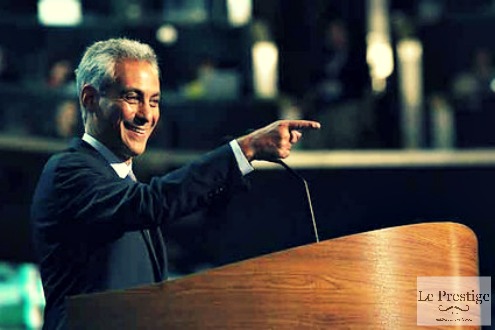
Education Reporter
CHICAGO - 25,000 teachers in the nation's third-largest district have responded to Mayor Emanuel's demand that teacher evaluations be tied to student performance by walking off the job for the first time in 25 years.
Chicago's teachers have drawn the hardest line in recent memory against using student test scores to rate teacher performance. "It has been a very tough issue across the country," said Rob Weil, a director at the American Federation of Teachers, one of the nation's two largest teachers' unions. "Teachers in many places believe that they see administrations and state legislatures creating language and policies that's nothing more than a mousetrap."
Chicago Mayor Rahm Emanuel is excited to implement the new evaluations, and that is one of the main points of contention in a challenging negotiation between the Chicago Public Schools and the Chicago Teachers Union, which president Karen Lewis has called "a fight for the very soul of public education."
The strike, which has left approximately 370,000 students out of class as the city and the union also fight over pay and job security, entered its fourth day Thursday. After late night talks Wednesday, both sides expressed optimism that students would be back in class as soon as Friday.
The push to judge teachers in part by their student's work stems from the reform efforts of the Obama administration, which has used its $4 billion Race to the Top competition and waivers to the federal No Child Left Behind law to encourage states to change how teachers are assessed.
Teachers unions argue that doing so ignores too many things that can affect a student's performance, such as poverty, a child's family environment, the ability to speak English, or even a school's lack of air conditioning. As Carmen Delgado, a science teacher in Chicago, stated, "You are going to judge us on the results of the tests where there could be some external circumstances that are beyond my control? Are we as teachers responsible for our child's home culture as well?"
Illinois lawmakers voted in 2010 to require that all public schools use student achievement as a component of teacher evaluations by the 2016-17 school year. In Chicago, Emanuel is attempting to stick to his promise made during his inauguration speech by demanding the Chicago Teachers Union agree to make the change years ahead of that schedule.
"As some have noted, including (his wife) Amy, I am not a patient man," Emanuel said after he was sworn in as mayor a year ago. "When it comes to improving our schools, I will not be a patient mayor."
The issue of teacher evaluations has only been on the table in Chicago for a few months, and Emanuel acknowledged this week that his swift push for change could be a factor in why his relationship with the union has been so contentious. In other big cities, a more patient approach has led to success in finding agreement with reluctant teachers.
The deal reached Wednesday in Boston will allow administrators to rely more heavily on student achievement in crafting teacher evaluations and remove from the classroom those receiving poor evaluations within 30 days. That contract came after 400 hours of contract negotiations that spanned more than 50 separate sessions over two years.
"Change is hard and is often hard-fought. But we should make special note that through all the tough negotiations, neither side let their frustrations spill onto the students of the Boston Public Schools," said Mayor Thomas Menino. "I tell you, this is a contract that's great for our students, works for our teachers and it's fair to our taxpayers."
As of Thursday morning, negotiations between the Chicago Teachers Union and Mayor Emanuel were said to be developing.


 RSS Feed
RSS Feed

